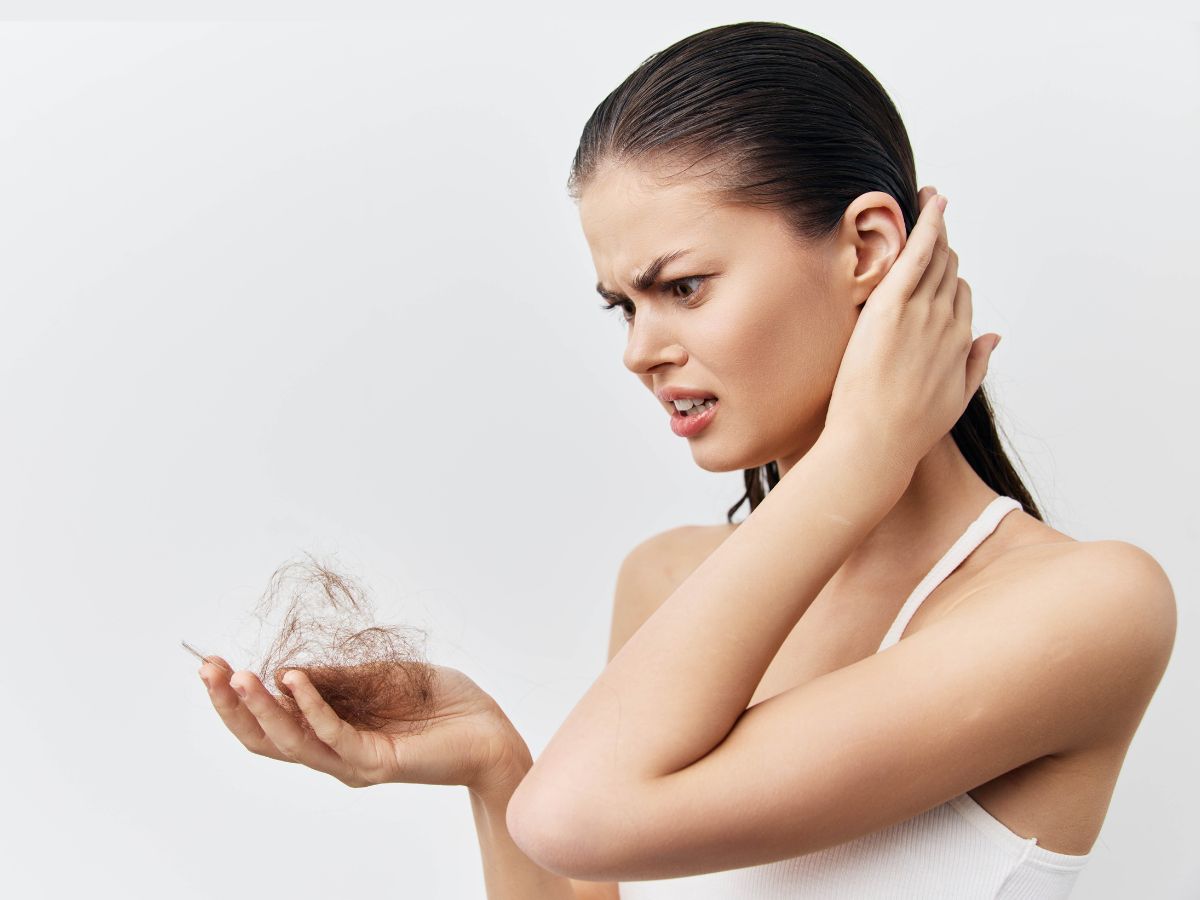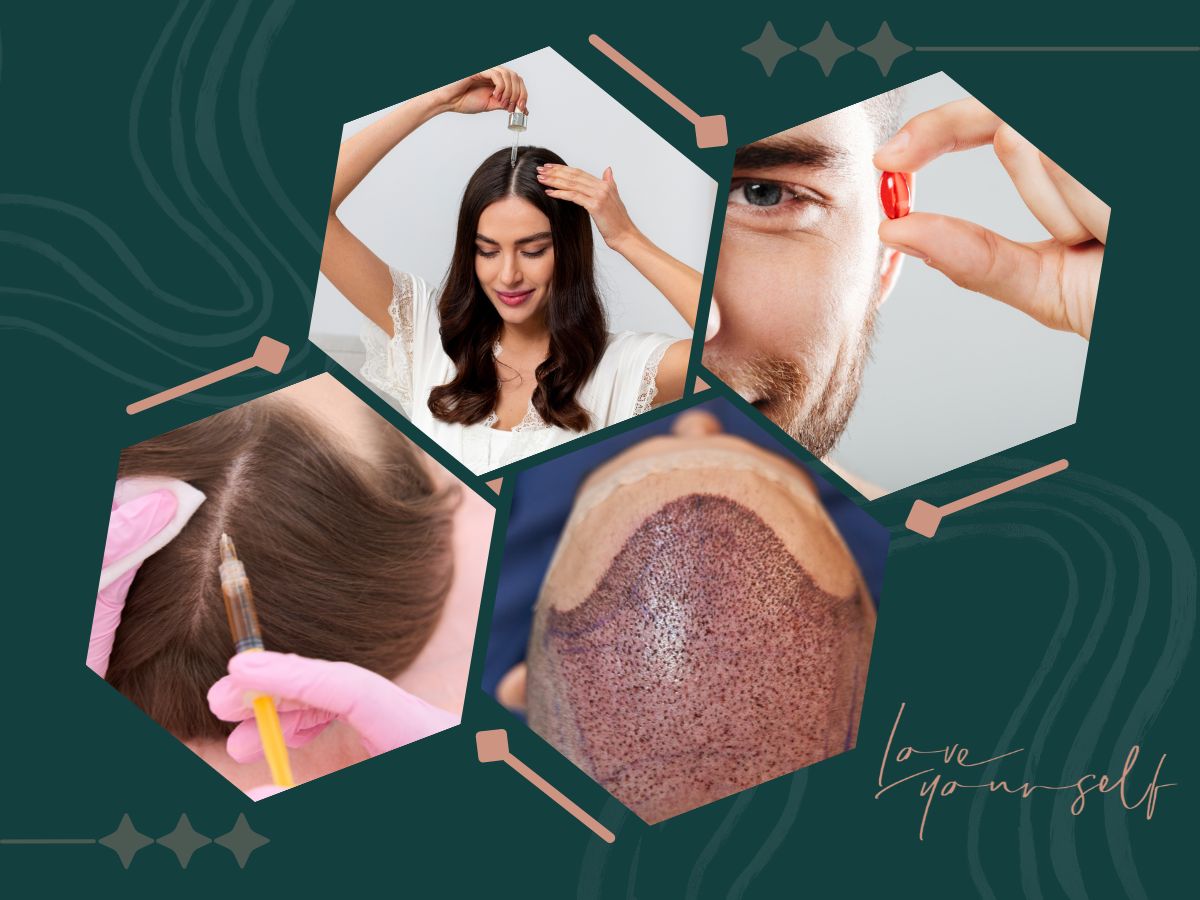
Hair Fall Problem is a common concern that impacts people of all ages and genders. It can be a traumatic and disheartening experience to see strands of hair stuck to your comb or on the surface of the bathroom. At some point, you might even feel that you’re losing control over your hair fall, which can lead to low self-confidence and emotional distress. But there’s hope! You can control and minimize hair fall effectively with the right approach. In this blog, we will discuss in detail hair fall reasons, ways to prevent hair loss, and some professional Hair Fall Treatment.
Different Hair Fall Reasons You Should Know
 So, let’s start by going over some reasons for hair loss that are relatively common.
So, let’s start by going over some reasons for hair loss that are relatively common.
1. Genetics
Genetic factors are the highest contributor to hair fall reasons in both males and females. This is also referred to as Androgenetic alopecia (male or female pattern baldness), in which your hair gradually becomes thin, and bald spots(in men) can appear with age.
2. Hormonal Changes
In women, hormonal changes during different stages such as pregnancy, menopause, or old age thyroid disorders are common hair fall reasons in female that result in hair loss.
3. Nutritional Deficiencies
Nutrition is one of the factors that support the growth and health of hair. Otherwise, the lack of many nutrients such as Iron, Zinc, Copper, Biotin, Protein, Vitamins D and E may weaken the roots of hair and lead to hair fall.
4. Scalp Infection
Other underlying factors like dandruff, fungi infections, and psoriasis deplete the scalp and weaken the hair follicles, this also can lead to hair loss over time.
5. Stress
Stress can also be a factor for hair fall. Increased emotional or physical stress may knock your hair growth cycle off balance and push it into the resting phase, a process called telogen effluvium, which then encourages excessive hair loss.
6. Choices and Lifestyle
Like many parts of your body, the hair is also affected by some of your choices. Regular use of heat styling tools, tight hairstyles, and exposure to chemical products can cause hair loss by weakening the roots and the shafts.
7. Health and Medical Conditions
Some diseases for example, anemia, autoimmune disorders, medicines to treat cancer, high blood pressure, and chemotherapy medications can be a cause for temporary or in some cases permanent hair loss as well.
What Amount Of Hair Fall Would Be Considered Normal?

As a human being, it is natural for you to lose some of your hair every so often. But, how much hair fall is normal? Most people are said to lose about 50-100 hair strands daily. The number might seem overwhelming but given the fact that people have an estimate of over 100,000 hair follicles, this is fairly normal. If you happen to witness this above the average then yes, this is the point when you need to start being concerned.
Immediate Solutions to Control Your Hair Fall
 We’ve talked about the various causes of hair loss. Now, let’s take a look at hair fall solution that help to support hair growth and prevent hair fall.
We’ve talked about the various causes of hair loss. Now, let’s take a look at hair fall solution that help to support hair growth and prevent hair fall.
- Gently Untangle Hair
Use a wide toothed comb when combing wet hair, minimize the use of hair straighteners and curlers, and don’t force your natural hairstyle that will stress your hair.
- Apply Essential Oils on Your Scalp
Scalp massages are great for your hair. They increase blood flow to your hair follicles and speed up new hair growth. Do a light pressure massage for 5-10 minutes once a day on the areas where you lose the most hair using your fingertips.
- Say No To Harsh Chemicals
Chemicals may damage your scalp and hair follicles and even stop healthy hair from growing. Therefore, use hair gels, lotions, shampoos, and conditioners that have fewer sulfates and parabens and avoid heavy and strong chemicals altogether.
- Make Sure To Drink Sufficient Amounts Of Water
Having insufficient water can be very harmful as it can result in hair and scalp dryness. Therefore, in order to keep your hair and scalp hydrated, it is essential to drink plenty of water (8 to 10 glasses) on a daily basis.
- Maintain A Proper And Balanced Diet
Proper diet is important not only for people’s general health but also for their hair as there are some foods that are beneficial for hair such as iron, protein, zinc, and vitamins D and E. Additionally, meals that are complemented with fruits, dry fruits, and green vegetables can further encourage healthier hair.
- Control Stress and Manage Emotions Appropriately
Therapies that can help deal with stress include meditation, yoga, etc. Therefore, do everything that helps you relax if you feel you are under too much stress as it can affect your hair.
- Trim Your Hair On A Regular Basis
Getting your hair trimmed can help avoid split ends and further damage while also enhancing the overall appearance of your hair.
Dermatologist Recommended Treatments for Hair Fall
 Here are some professional treatments for hair fall control recommended by dermatologists. Let’s have a look.
Here are some professional treatments for hair fall control recommended by dermatologists. Let’s have a look.
- Minoxidil
Minoxidil is a US FDA approved medication to treat hair fall. It’s available in liquid or foam form and works by extending the growth cycle of hair and stimulating hair follicles to produce thicker and longer hair. You can apply minoxidil directly on the affected areas of your scalp, usually once or twice a day.
- Finasteride
Finasteride is also a US FDA approved oral medication to stop hair loss. It’s mainly used to treat male pattern baldness and works by blocking the conversion of testosterone to dihydrotestosterone (DHT), a hormone that contributes to hair loss. You should take Finasteride as prescribed by your dermatologist.
- Platelet-rich plasma (PRP) therapy
PRP (Platelet-rich plasma) is the most popular treatment for hair loss used by dermatologists. In this therapy, your own blood is used to stimulate hair growth. The procedure involves taking out your blood, processing it to concentrate the platelets, and injecting it into the scalp. The growth factors present in the platelets boost hair growth and hair density.
- Hair transplant surgery
Hair transplant surgery can be the best option if you are experiencing severe hair loss. This procedure involves extracting hair follicles from areas of the scalp with healthy hair growth and transplanting them to areas with thinning or balding. You can consult Dr. Navnit Haror, the best hair doctor in Delhi – a certified dermatologist and hair transplant expert to discuss the pros and cons of hair transplant surgery.
When to Consult a Hair Doctor
If you are experiencing persistent and severe hair fall, it’s important to consult a dermatologist or hair fall doctor. Also, check for the below symptoms:
- Bald patches and noticeable hair thinning
- Scalp conditions like itchy scalp, redness, or pain
- Sudden and excessive hair fall after an illness or medication
The earlier you notice these signs and seek dermatological interventions, the better it will be to control your hair loss.
Conclusion
Hair fall can be a traumatic experience, but with prompt care and the right approach, you can control it. Understanding the reasons behind hair fall and ways to stop it, can help in managing hair loss. But still, if the problem persists, you can consider the recommended treatments and expert dermatologist consultation for long-term solutions.
Are you experiencing hair loss and searching ‘hair fall doctor near me’? Then your search ends here at Dr. Haror’s Wellness. Dr. Navnit Haror, the best hair doctor for hair fall treatment in Delhi, has extensive experience in hair loss treatment and hair transplant procedures. Get in touch with us today!





